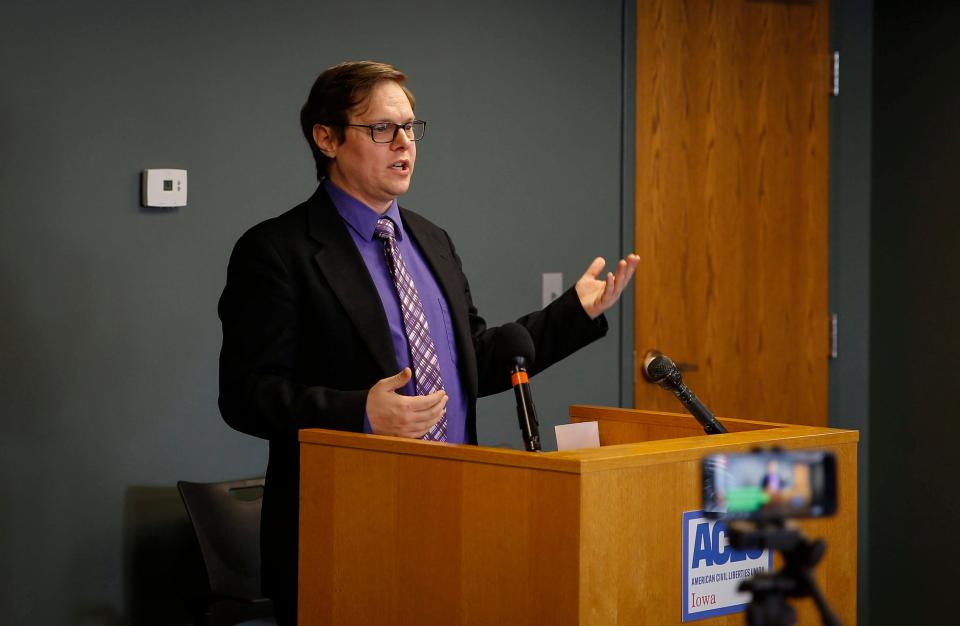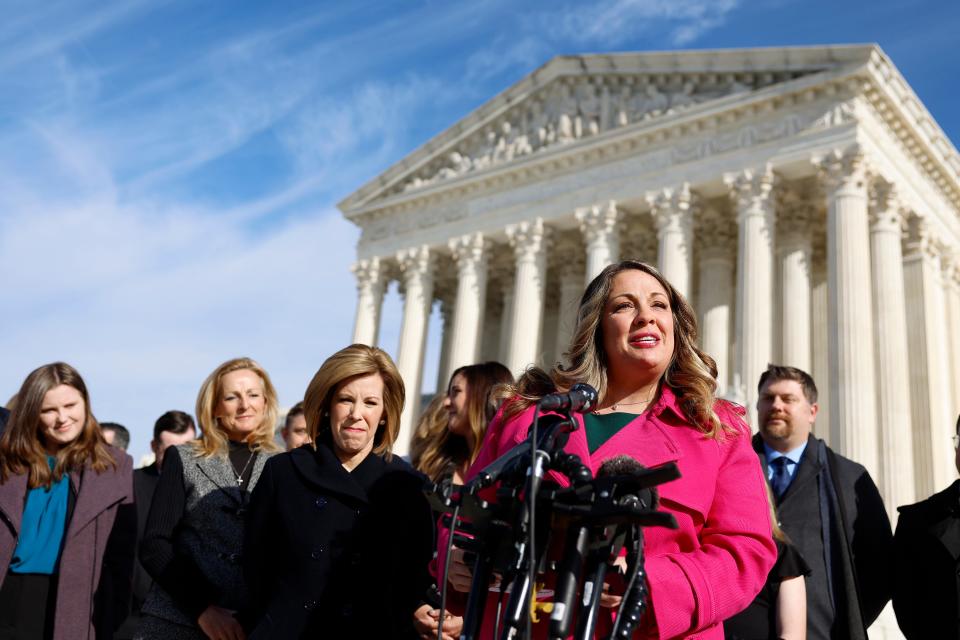Supreme Court backs web developer who didn't want to create same-sex wedding sites
- Oops!Something went wrong.Please try again later.
- Oops!Something went wrong.Please try again later.
The Supreme Court on Friday backed a web designer who wants to decline to create websites for same-sex weddings because of her religious beliefs — the latest legal setback for LGBTQ Americans from the high court.
Justice Neil Gorsuch wrote the opinion for a 6-3 majority. The case was decided on ideological lines.
"Laws along these lines have done much to secure the civil rights of all Americans," Gorsuch wrote. "But in this particular case, Colorado does not just seek to ensure the sale of goods or services on equal terms. It seeks to use its law to compel an individual to create speech she does not believe."
In a case that could have profound implications for deciding when businesses may turn away customers, the Colorado website designer argued a state anti-discrimination law couldn't be used to compel her to develop same-sex wedding sites.
It is the latest in a series of cases to reach the court pitting business owners against LGBTQ customers, although this one focused on free-speech rights more than religion.
In a scathing dissent that she read from the bench, Justice Sonia Sotomayor said the case involves "a business open to the public [that] seeks to deny gay and lesbian customers the full and equal enjoyment of its services based on the owner’s religious belief that same-sex marriages are 'false.'"
"The business argues, and a majority of the court agrees, that because the business offers services that are customized and expressive, the free speech clause of the First Amendment shields the business from a generally applicable law that prohibits discrimination in the sale of publicly available goods and services," Sotomayor said. "That is wrong. Profoundly wrong."
Case tracker: Race, religion and debt: Here are the biggest cases pending at the Supreme Court
In Iowa, gay rights advocates decried the decision.
Courtney Reyes, executive director of the LGBTQ advocacy group One Iowa, said the court’s ruling "again grants special treatment to their preferred brand of Christianity."
But Reyes noted the ruling’s scope is limited to certain types of work.
“For the vast majority of businesses, this exception will not apply,” she said in a statement. “Iowans will continue to have their rights protected in virtually every transaction, but the doubt the court has thrown on such protections will contribute to an erosion of trust even if their carve-out does not extend to such activities.”
Keenan Crow, lobbyist for One Iowa, advised same-sex couples in Iowa to double-check with wedding vendors following the decision.
“It's hard to determine where that line of expressive versus nonexpressive actually is, and we will likely need further litigation to clear that up,” Crow said. “What I would tell anybody planning a wedding right now is plan ahead and start having explicit conversations with your vendors about what your wedding consists of and what they're willing to do.”

Iowa among two-dozen states that prohibit discrimination based on sexual orientation
A Colorado law bars public businesses such as hotels and restaurants from discriminating on the basis of sexual orientation — the same law that bars discrimination based on race and gender. Twenty-four other states also bar businesses from discrimination based on sexual orientation.
But during oral arguments in December, the court's conservative justices questioned whether a website designer is more like a retail business or more like an artist. Government is generally barred from compelling an artist — or anyone else — to convey a message that they disagree with.
In 2007, Iowa added sexual orientation and gender identity as protected classes under the state’s Civil Rights Act. That prohibits businesses from discriminating against an employee or customer because of their gender or sexuality.
A Grimes gallery became the subject of controversy in 2013 when the Mennonite owners denied a same-sex couple the opportunity to get married at their venue. The owners settled with the same-sex couple and refused to hold any more weddings, gay or straight.
The venue closed permanently in 2015, just days before the U.S. Supreme Court legalized same-sex marriage nationwide. Iowa has recognized same-sex marriage since 2009.
Crow, of One Iowa, said the Grimes case centered on religious liberty, rather than the free-speech claims brought by Smith.
“There's really no expressive conduct involved here,” Crow said. “The venue is not speaking in any way. And so, therefore, the outcome of that case is unlikely to change.”
Why a Denver web designer took her case to the Supreme Court
Lorie Smith, the owner of 303 Creative, a Denver-based website design firm, said she didn't object to serving LGBTQ customers — only same-sex weddings. Because Smith's websites are custom creations, they represent her speech as well as that of her customers, her lawyers argued.
Smith was never approached by an LGBTQ couple seeking a matrimonial website. Rather, she wanted the high court to invalidate the Colorado law before that could happen.
Alliance Defending Freedom, a religious rights group that represented Smith, said the decision underscored the idea that the government "can’t mislabel speech as discrimination to censor it."
“The U.S. Supreme Court rightly reaffirmed that the government can’t force Americans to say things they don’t believe," said Kristen Waggoner, the group's president. "The court reiterated that it’s unconstitutional for the state to eliminate from the public square ideas it dislikes, including the belief that marriage is the union of husband and wife."
Critics said Smith's argument would allow businesses to skirt anti-discrimination laws.
“Today’s smug attack on civil rights law will have limited practical impact in the marketplace because few commercial services involve original artwork and pure speech offered as limited commissions," said Lambda Legal Chief Legal Officer Jennifer Pizer. "But today’s narrow decision does continue the court majority’s dangerous siren call to those trying to return the country to the social and legal norms of the Nineteenth Century because it jettisons without even acknowledging what was part of the legal test for decades."
The Alliance Defending Freedom has been an active player in Iowa politics.
Lawyers from ADF represented the state in an unsuccessful attempt to allow a restrictive 2018 abortion law to take effect. The group submitted an amicus brief in support of parents suing the Linn-Mar school district over its accommodations for transgender students.
The ADF was also the force behind some of the LGBTQ-related laws passed this year. Sen. Jeff Edler, R-State Center, said the group helped draft Iowa’s law to prohibit gender-affirming medical care for transgender minors.
LGBTQ rights come into conflict with religious beliefs
After a landmark victory in 2015 legalizing same-sex marriage and another win in 2020 that banned workplace discrimination on the basis of sexual orientation, the outlook for LGBTQ rights at the U.S. Supreme Court has dimmed in recent years — especially when those rights are in tension with the First Amendment's protection of religious freedom.

The nation's highest court sided with a Catholic foster care agency in Philadelphia in 2021 that declined to consider same-sex couples as clients. And in its decision last year to overturn Roe v. Wade, Associate Justice Clarence Thomas suggested it may also be time to "reconsider" same-sex marriage — a notion that prompted a political backlash and bipartisan legislation that requires states to recognize those marriages.
Colorado and its supporters have asserted that a win for Smith could have consequences beyond LGBTQ rights. If a business may decline to create a website for an LGBTQ couple based on an objection to same-sex marriage, they argued, couldn't it also decline to make one for an interracial family?
More: White women benefit most from affirmative action. So why do they oppose it?
But during the arguments in December, several of the court's conservative justices pushed back on that assertion of a slippery slope. Associate Justice Samuel Alito repeatedly referenced a line from the 2015 decision to legalize same-sex marriage in which the court said "many who deem same-sex marriage to be wrong reach that conclusion based on decent and honorable religious or philosophical premises."
In other words, Alito asserted then, the majority in Obergefell v. Hodges recognized legalizing same-sex marriage would present a conflict with religious entities and individuals in a way that race and gender do not.
Those conflicts have repeatedly risen to the high court.
In 2018, a 7-2 majority of the justices sided with a Colorado baker who refused to create a custom wedding cake for a same-sex couple. But that decision was focused narrowly on how the state's civil rights commission treated the baker, Jack Phillips. The court did not rule on broader questions about where to draw the line between a business owner's religious freedom and LGBTQ rights.
In a twist in the present case, the Supreme Court declined to hear Smith's religious freedom claim. Instead, it agreed last year to decide only whether Colorado's anti-discrimination law ran afoul of her free speech rights. Many experts speculate that's because the court's conservatives don't have the votes to overturn a controversial 1990 precedent, Employment Division v. Smith, that makes it harder to bring religious claims.
John Fritze is the Supreme Court correspondent for USA TODAY.
Katie Akin is a politics reporter for the Register. Reach her atkakin@registermedia.com. Follow her on Twitter at @katie_akin.
This article originally appeared on USA TODAY: Supreme Court: Web designer may deny services for same-sex weddings

